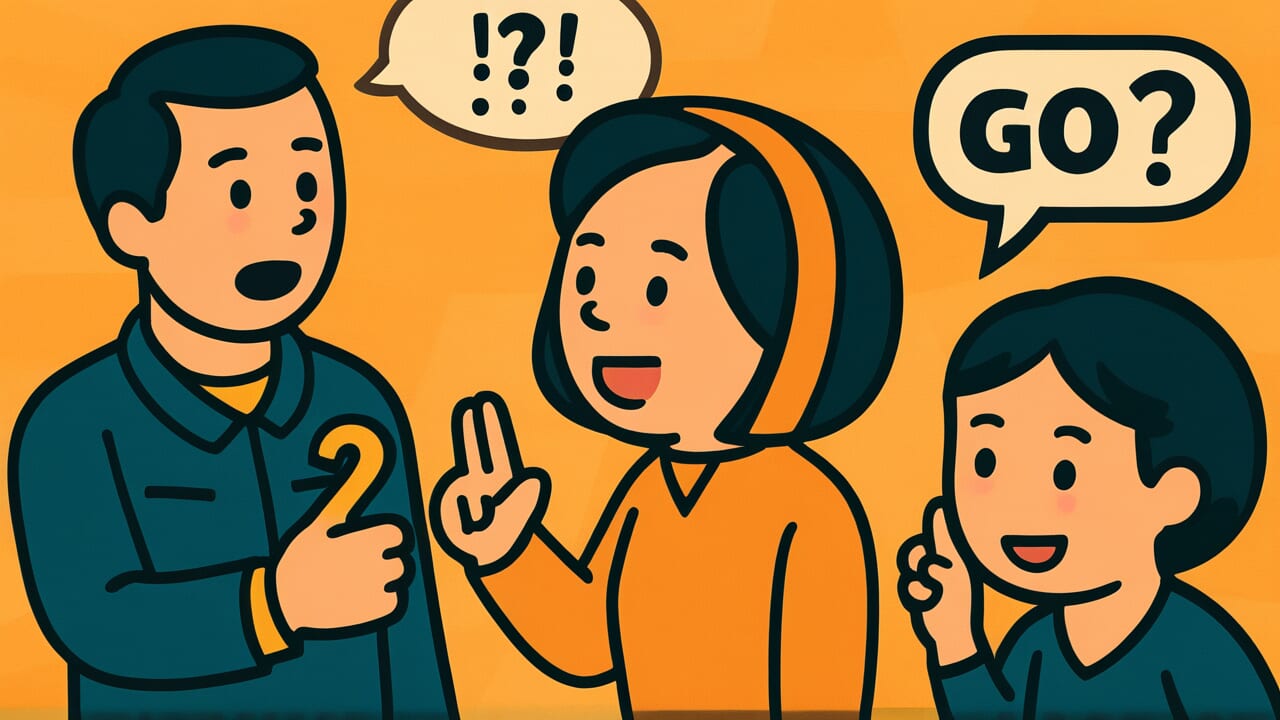How to Read “If the asking voice is good, the answering voice is good”
Toi goe yokereba irae goe yoi
Meaning of “If the asking voice is good, the answering voice is good”
“If the asking voice is good, the answering voice is good” means that when you ask someone something with a gentle and polite attitude, their answer will naturally be polite and kind too.
On the other hand, if you ask with a rough attitude or arrogant tone, the other person will respond coldly.
This proverb shows how important interaction is in communication. When you ask for directions, question a store clerk, or seek advice at work, your attitude determines the other person’s response.
This teaching applies to all situations today. Whether you’re contacting customer service, consulting your boss, or asking a favor from a friend, the same principle holds true.
If you want good answers and cooperation from others, you must first approach them with respect. Human relationships are like mirrors.
What you send out comes back to you. This is simple yet profound wisdom about life.
Origin and Etymology
There are no clear written records about the origin of this proverb. However, we can make interesting observations from how the words are structured.
The paired expressions “asking voice” and “answering voice” are striking. “Irae” is an old way of saying “answer.”
The verb “iraeru” is no longer used in modern Japanese, but it was once part of everyday language. This paired structure is characteristic of how traditional Japanese teachings are expressed.
This proverb likely emerged from wisdom gained through daily communication. Merchants and customers, masters and apprentices, parents and children—in all these relationships, people noticed something important.
The way you ask determines the quality of the answer you receive. This experience accumulated over time and eventually became established as a teaching.
The choice of the word “voice” is particularly noteworthy. Rather than simply saying “way of asking” or “way of answering,” using “voice” includes everything.
It encompasses not just the content of words, but tone, attitude, and respect for the other person—all the emotions contained in a voice.
This reflects the Japanese sensitivity to communication. How you say something matters just as much as what you say.
Usage Examples
- When teaching new employees, remember that if the asking voice is good, the answering voice is good—if you ask politely, senior staff will teach you kindly
- Even with complaint calls, if the asking voice is good, the answering voice is good—when I spoke in a calm tone, the other person’s response changed dramatically
Universal Wisdom
“If the asking voice is good, the answering voice is good” reveals the most fundamental law of human relationships. What we receive from others is a reflection of what we give.
Why has this teaching been passed down through the ages? Because humans have an instinctive tendency to adjust their attitude based on how others treat them.
We open our hearts to people who approach us gently. We become defensive when faced with aggressive attitudes.
This is a universal psychological mechanism that transcends culture and time.
What makes this proverb profound is that it doesn’t just teach etiquette. It shows that the person asking actually holds the power in the relationship.
The asker’s attitude determines the answerer’s attitude. If you want a good response from someone, you can simply change yourself first.
This is active wisdom for living.
Everyone has a desire to be treated with care. When people feel valued, they naturally want to give something good back.
This reciprocity is the foundation that holds human society together. Our ancestors discovered this great truth in small daily exchanges.
When AI Hears This
Place two tuning forks side by side and strike one. The other will start vibrating too.
This is resonance—it happens when the vibration frequency of one matches the natural frequency of the other. Human voices work on the same principle.
When the “acoustic characteristics” of your words match the natural frequency of the other person’s psychological state, you get the maximum response.
Interestingly, sound resonance has two patterns: amplification and damping. With the right frequency, even a small sound resonates loudly.
With the wrong frequency, even a loud sound gets absorbed and disappears. In other words, it’s not the volume or quantity of words that matters.
It’s the “frequency match” with the other person’s state that determines the quality of response.
Speaking calmly to an angry person doesn’t resonate because you’re sending low frequencies when their mind is vibrating at high frequencies.
In acoustics, there’s a phenomenon called “standing waves” where reflected waves interfere with the original waves. A good question draws out a good response.
That response then positively affects you. When this exchange repeats, the quality of communication gradually improves, like sound amplifying in an enclosed space.
Send out discord, and destructive interference occurs, muddying the entire conversation. Human relationships are invisible exchanges of sound waves.
Lessons for Today
This proverb teaches modern people about “the power of taking initiative” in relationships. When we’re unhappy with someone’s attitude, we tend to blame them.
But this proverb offers hope. It shows we can change the situation by changing our own attitude.
If your boss seems cold at work, try consulting them politely first. If a store clerk’s service seems poor, try speaking to them gently first.
If a friend seems distant, try approaching them warmly first. This choice to “show good attitude first” is much more realistic and effective than trying to change others.
This teaching becomes even more valuable in our modern age of social media and email. When we can’t see faces, communication happens through text alone.
In these exchanges, small choices in wording greatly influence the other person’s response.
You have the power to draw out good reactions from people around you. It’s not a special talent.
It starts with a small choice anyone can make—asking in a gentle voice.



Comments